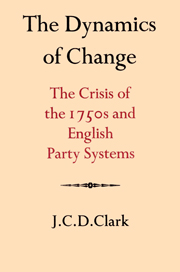Book contents
- Frontmatter
- Contents
- Preface
- Note on references
- Abbreviations
- Dedication
- Introduction
- 1 The Accession of Newcastle, March–September 1754
- 2 The Defeat of the Pitt–Fox Alliance, October 1754–March 1755
- 3 The Reconstruction of the Ministry, April–September 1755: Leicester House and the Recruitment of Fox
- 4 ‘That Exploded Trick’: Newcastle, Fox and the Defeat of Leicester House Patriotism, October 1755–March 1756
- 5 The Resignation of Newcastle, April–October 1756
- 6 The Pitt–Devonshire Ministry, October 1756–March 1757
- 7 ‘The Arbiter of England’: the Formation of the Newcastle–Pitt Coalition, April–June 1757
- Conclusion
- Notes
- Bibliography
- Index
7 - ‘The Arbiter of England’: the Formation of the Newcastle–Pitt Coalition, April–June 1757
Published online by Cambridge University Press: 06 July 2010
- Frontmatter
- Contents
- Preface
- Note on references
- Abbreviations
- Dedication
- Introduction
- 1 The Accession of Newcastle, March–September 1754
- 2 The Defeat of the Pitt–Fox Alliance, October 1754–March 1755
- 3 The Reconstruction of the Ministry, April–September 1755: Leicester House and the Recruitment of Fox
- 4 ‘That Exploded Trick’: Newcastle, Fox and the Defeat of Leicester House Patriotism, October 1755–March 1756
- 5 The Resignation of Newcastle, April–October 1756
- 6 The Pitt–Devonshire Ministry, October 1756–March 1757
- 7 ‘The Arbiter of England’: the Formation of the Newcastle–Pitt Coalition, April–June 1757
- Conclusion
- Notes
- Bibliography
- Index
Summary
…I am convinced that there are two classes of causes, one ostensible and plausible, calculated to meet the publick eye and mind: the other from private and bye motives, which men scarcely dare to own to themselves.
Shelburne, in Fitzmaurice, Shelburne, i, 79FOX'S SECOND ATTEMPT TO FORM A MINISTRY, 30 MARCH-7 APRIL 1757
It was anticipated at Court that Cumberland would leave for Germany to take command of the Army of Observation during the week beginning Sunday, 3 April; in the event he left town for Harwich on Friday 8th and sailed on Sunday, 10th. Walpole records, and there seems little reason to doubt, Cumberland's aversion to that unwelcome task while the ministry remained: ‘If to be clogged with orders from Pitt, – if to be obliged to communicate with him, and depend on him for supplies, command itself would lose its lustre. Even if successful, the popularity of Pitt would ravish half his laurels; should he miscarry, his misfortunes would all be imputed to himself. Walpole claimed that it was Fox who ‘snatched at this dilemma’; but, in his last week in England, Cumberland too was active in assembling an alternative ministry on the lines of Fox's suggestion of 30 March. The key office was again the Admiralty. Cumberland brought Winchelsea to accept it without making conditions for himself, or about the rest of his Board. Holdernesse was on hand to arrange the formalities, so that Winchelsea could kiss hands on Monday, 4 April.
- Type
- Chapter
- Information
- The Dynamics of ChangeThe Crisis of the 1750s and English Party Systems, pp. 354 - 447Publisher: Cambridge University PressPrint publication year: 1982



